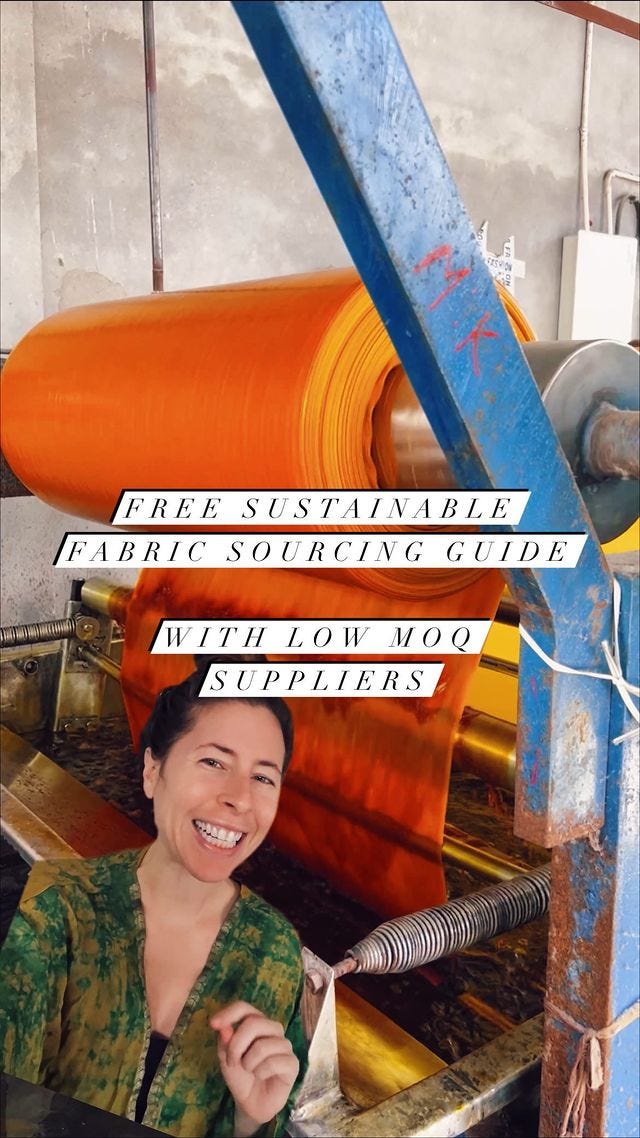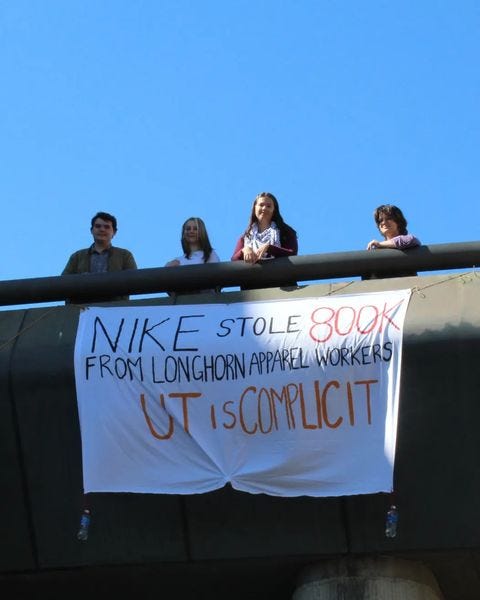Hey there, sustainability lovers!
As we enter the new year, we must reflect on our choices, especially in fashion. This edition is not just an update but a resolution - a commitment to sustainability in fashion.
Please join me in paying closer attention to our purchases and consuming less overall. Let's make this year about mindful consumption and ethical choices.
Do you like being ripped off?
In an era where fast fashion reigns supreme, the detrimental impact on the retail industry is often overlooked. Fast fashion has distorted our perception of fair pricing and sacrificed quality, craftsmanship, and materials. This has led consumers to undervalue the actual cost of well-made apparel.
Let's delve into how fast fashion has forced even high-end brands to compromise. Traditionally, retail prices were higher, discounts rarer, encouraging consumers to buy less but choose better quality. This meant retail margins hovered around 55-60%. However, introducing cheap, fast fashion, with its significantly lower prices and exploitative cost structure, distracted consumers with the option to purchase more for less.
This shift led to traditional brands losing market share. To compete, they had to lower retail prices. But with already slender margins, they couldn't afford substantial discounts. The solution? Three drastic measures:
Lowering retail prices.
Increasing margin expectations, and, most critically.
Reducing product specifications to meet these financial targets.
Today, high street margin targets often exceed 80%, pressuring suppliers to reduce costs by as much as 50% compared to pre-fast fashion times. The consequences are dire: poverty wages for workers and lower-quality materials.
Next time you consider a purchase from fast fashion brands, remember the compromised journey of that item - from its creation to its quality.
As we continue our journey into 2024, let's keep this knowledge at the forefront of our minds. By supporting sustainable fashion, we're making a statement about our personal style, values, and the world we want to live in. Remember, each purchase is a vote for the kind of future we want to see.
Let's make it count.
Measuring and Controlling Fashion's Carbon Footprint Through Digital Fabrics
As the fashion world stands at a crossroads of innovation and environmental responsibility, Frontier's new white paper delves into the transformative power of digital fabrics.
Designing a Sustainable Revolution in the Fashion Industry
Is a sustainable future in fashion achievable? Stephanie Benedetto, co-founder of Queen of Raw, answers with a resounding yes, armed with technological innovation and environmental stewardship. Her pioneering tech solution redefines the marketplace and catalyzes textile waste reduction, transforming surplus fabric into endless potential. With every transaction, the industry moves closer to a greener, more sustainable world.
ULTIMATE SUSTAINABLE FABRIC SUPPLIER GUIDE by Melanie DiSalvo
Loewe SA almost doubled its profits in 2022
At Loewe, the strategy of managing director Pascale Lepoivre and the success of creative director Jonathan Anderson drove performance last year. According to the accounts filed with the Spanish Chamber of Commerce and sent to Europapress by Infoempresa, Loewe SA closed its 2022 financial year with a 37% increase in sales to EUR 626 million. At more than 161 million euros, gross profit was 92% higher than in 2021.
Why Do Baby Clothes Need to Be Flame Resistant?
If you shop at Carter's or Target for kids' clothes, you probably have yet to learn about the laws concerning flame resistance laws for toddler clothing in the US (I'll explain why that is in the article). It wasn't until I started buying organic toddler clothing and bamboo that I was suddenly bombarded with bright yellow tags stating:
'That's not a Black Friday deal': Pinched shoppers hold out for deeper discounts—boding ill for earnings.
Black Friday sales show US consumers are watching their wallets and holding out for deeper discounts. This sets retailers up for a subdued holiday shopping season and potentially lackluster earnings results early next year.
State of the Fake: A Snapshot of the Global Counterfeit Market
Fifteen people in China were sentenced to jail and fined for their role in a six-year, $40 million-plus criminal ring involving counterfeit Rolex watches. The People's Court of Zhenjiang Economic Development Zone found them guilty of illegal counterfeiting and using Rolex's trademarks to sell fake watches. The court emphasized that the group's actions seriously damaged the reputation of the Rolex trademark and disrupted the market economy.
Nike criticized over 'unnecessary' £45 baby trainers as expert warns some shoes could hinder walking.
Yet another unnecessary product that harms and pushes for consumerism. Nike says Swoosh 1's can 'help promote natural foot development,' but experts generally advise babies to wear no shoes at all.
France to pay bonus for shoes and clothing repairs to cut waste.
From October, France will pay a bonus to encourage people to have their clothes and shoes repaired rather than throwing them away, the government said.
The move aims to cut down on the 700,000 tonnes of clothes thrown away by French people each year, two-thirds of which end up in landfills.
Daniel Pimentel: Sustainable fashion is a farce without virtual try-ons
As the fashion industry grapples with its contribution to the climate crisis, brands must confront this kink in their supply chain. High return rates can undo the good done by sustainable fashion efforts.
How Vuori defied the DTC apocalypse to become a $4 billion athleisure juggernaut
Vuori's founder struggled for years to secure VC funding. That turned out to be the key to the brand's incredible success.
Industrializing Circularity: A Vision For The Fashion Industry
Fashion has reached the stage where sustainability commitments must urgently translate into change in the core industrial processes that bring products to market. How will we measure progress? And is the ghost of perfection paralyzing the action potential?
H&M vows to pay factory workers more. Why aren't other brands stepping up?
In Bangladesh, people need $302 monthly to prevent their families from starving. However, the monthly minimum wage for years has been $74. It is worth noting that many clothes brands, including Zara, Gap, and Calvin Klein, manufacture their products in Bangladesh. Unfortunately, the workers who make those t-shirts and dresses must suffer inhumane conditions.
H&M is the only brand that has spoken up (so far, words only) and supported the workers. It is disappointing that no other brands have done the same, even though many claim to help the ethical treatment of workers.
The dirty side of the fast-fashion business
How harmful chemicals end up in the clothes we wear.
Black Friday hypocrisy — consumerism versus sustainable fashion
As Black Friday and Cyber Monday discounts continue, the disconnect between consumerism and sustainability within the fashion industry is ever more apparent.
'Buy-sell-trade party': ThriftCon is coming to Charlotte to share sustainable fashion
Whether you're in a '70s groove or a Y2K mood, at this "buy-sell-trade party," you'll have the option of buying secondhand and vintage clothing with some pieces starting at just $1 and typically ranging from $10 to $50.
A look at affordable clothing: Fast fashion vs. the recycled, resale market
Harmony Richards of Remake says the number of garments produced yearly has doubled in the last two decades, leading to more goods in landfills.
Vera
I really hope you're enjoying The Sustainability Pulse, my weekly newsletter looking at sustainability in the fashion industry. If you find the tips and insights useful, please share these articles to help spread the word.





